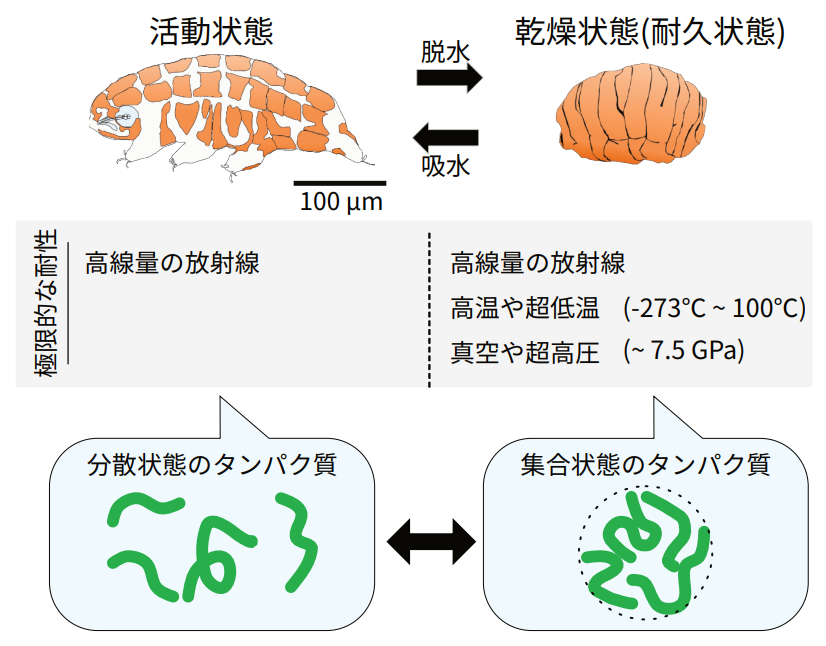2022-09-07 スイス連邦工科大学ローザンヌ校(EPFL)
ARDS(急性呼吸窮迫症候群)に対処する新しい治療戦略は、感染因子と戦うのではなく、宿主の自然な適応ストレス反応を高めることによって、炎症性のチャレンジに対する宿主の耐性を引き出すことができる。
ドイツ連邦工科大学のAdrienne Mottis教授らは、そのような戦略の1つとして、「マイトホルメシス」と呼ばれる生物現象を利用することができることを明らかにした。ミトホルメシスとは、細胞のミトコンドリアに軽いストレスを与えることで、細胞の健康と生存率を高める一連の反応が引き起こされるという現象である。
ミトコンドリアはバクテリアから進化してきたため、抗生物質に対して感受性がある。そこで研究チームは、ミトコンドリアにストレスを与える可能性のあるさまざまな抗生物質を調べ、ミトコンドリアタンパク質の合成を阻害し、ニキビ、コレラ、ペスト、マラリア、梅毒など多くの感染症対策に用いられているテトラサイクリン系の新規分子を同定した。
研究チームは、52種類のテトラサイクリン系化合物をスクリーニングし、9-tert-ブチルドキシサイクリン(9-TB)など、低用量で使用してもミトコンドリア形成の誘発効果が高く、かつ抗生物質としての効果がない、つまり宿主のマイクロバイオームを阻害しない新規分子を選び出した。この化合物をマウスに投与したところ、軽度のミトコンドリアストレスと有益なマイトホルメシス反応が誘発され、インフルエンザウイルスによる感染に対する耐性が高まった。
<関連情報>
- https://actu.epfl.ch/news/stressed-mitochondria-help-cells-survive-respirato/
- https://www.jci.org/articles/view/151540#top
テトラサイクリンによるマイトホルメシスはインフルエンザに対する疾病耐性を媒介する Tetracycline-induced mitohormesis mediates disease tolerance against influenza
Adrienne Mottis, Terytty Y. Li, Gaby El Alam, Alexis Rapin, Elena Katsyuba, David Liaskos, Davide D’Amico, Nicola L. Harris, Mark C. Grier, Laurent Mouchiroud, Mark L. Nelson, and Johan Auwerx
Journal of Clinical Investigation Published July 5, 2022
DOI: 10.1172/JCI151540

Abstract
Mitohormesis defines the increase in fitness mediated by adaptive responses to mild mitochondrial stress. Tetracyclines inhibit not only bacterial but also mitochondrial translation, thus imposing a low level of mitochondrial stress on eukaryotic cells. We demonstrate in cell and germ-free mouse models that tetracyclines induce a mild adaptive mitochondrial stress response (MSR), involving both the ATF4-mediated integrative stress response and type I interferon (IFN) signaling. To overcome the interferences of tetracyclines with the host microbiome, we identify tetracycline derivatives that have minimal antimicrobial activity, yet retain full capacity to induce the MSR, such as the lead compound, 9-tert-butyl doxycycline (9-TB). The MSR induced by doxycycline (Dox) and 9-TB improves survival and disease tolerance against lethal influenza virus (IFV) infection when given preventively. 9-TB, unlike Dox, did not affect the gut microbiome and also showed encouraging results against IFV when given in a therapeutic setting. Tolerance to IFV infection is associated with the induction of genes involved in lung epithelial cell and cilia function, and with downregulation of inflammatory and immune gene sets in lungs, liver, and kidneys. Mitohormesis induced by non-antimicrobial tetracyclines and the ensuing IFN response may dampen excessive inflammation and tissue damage during viral infections, opening innovative therapeutic avenues.


